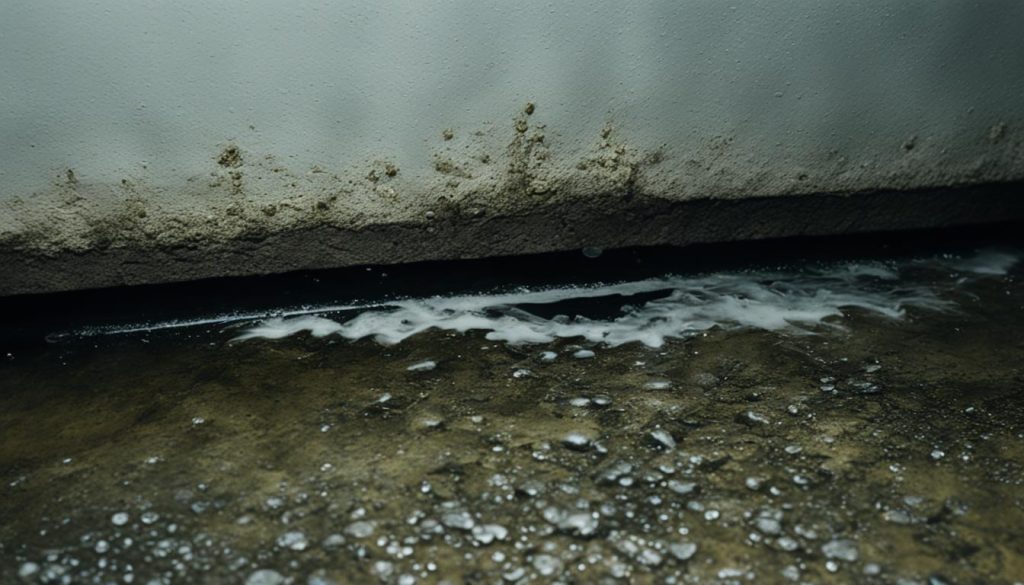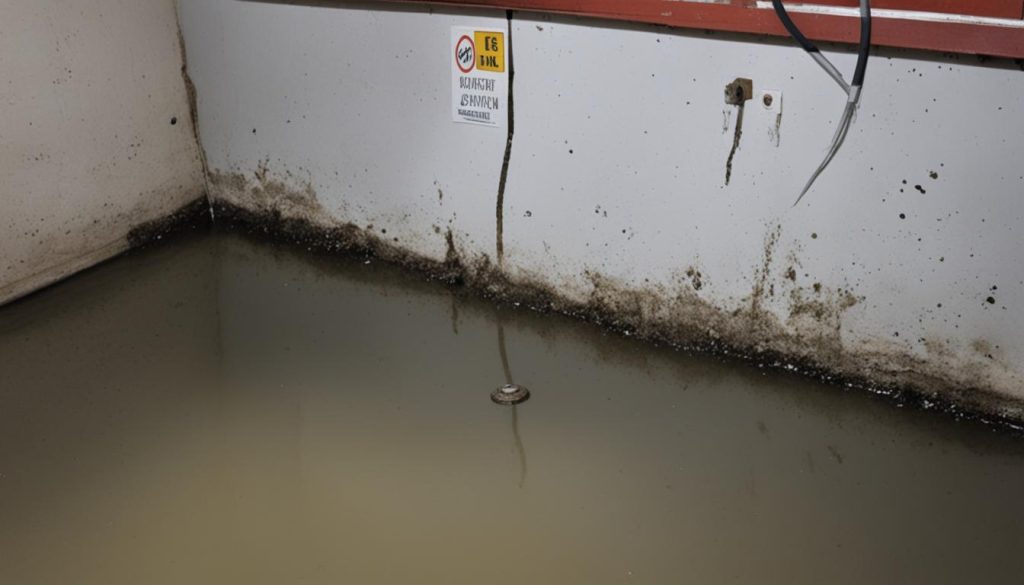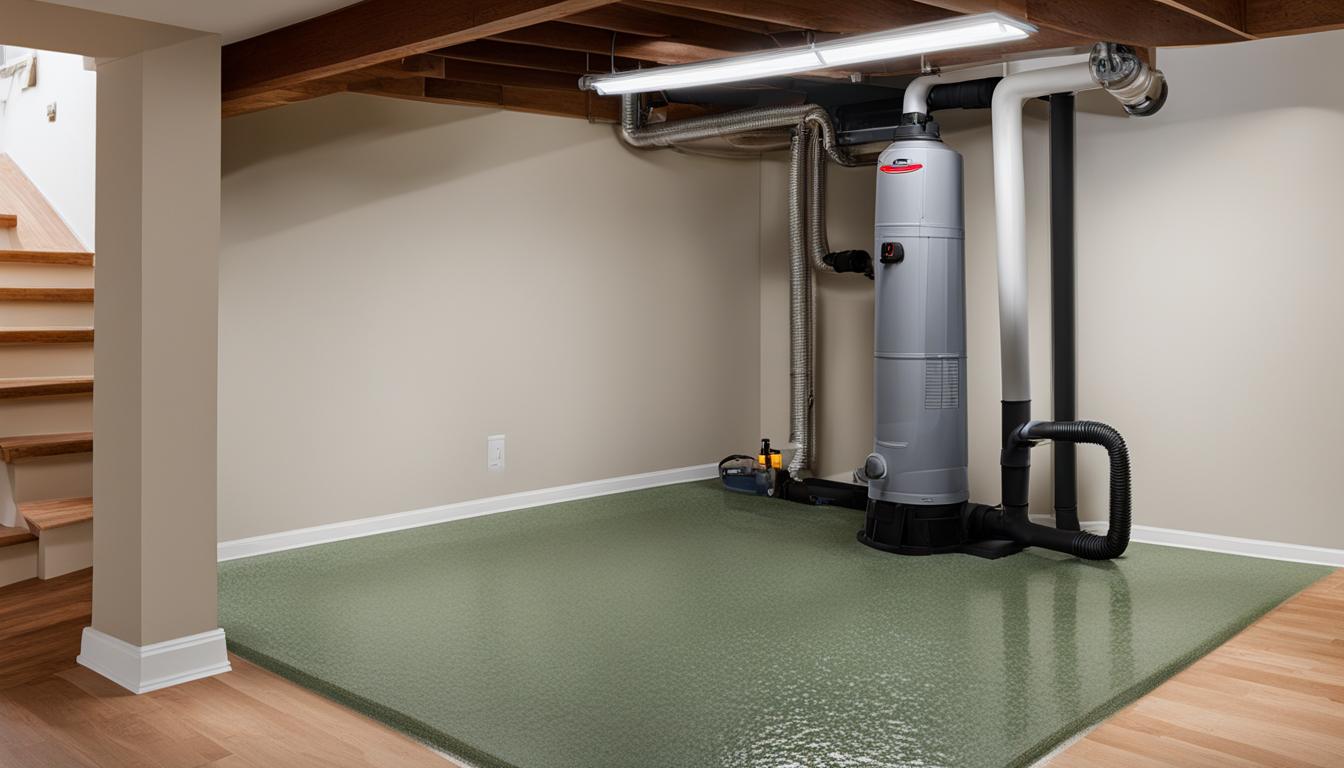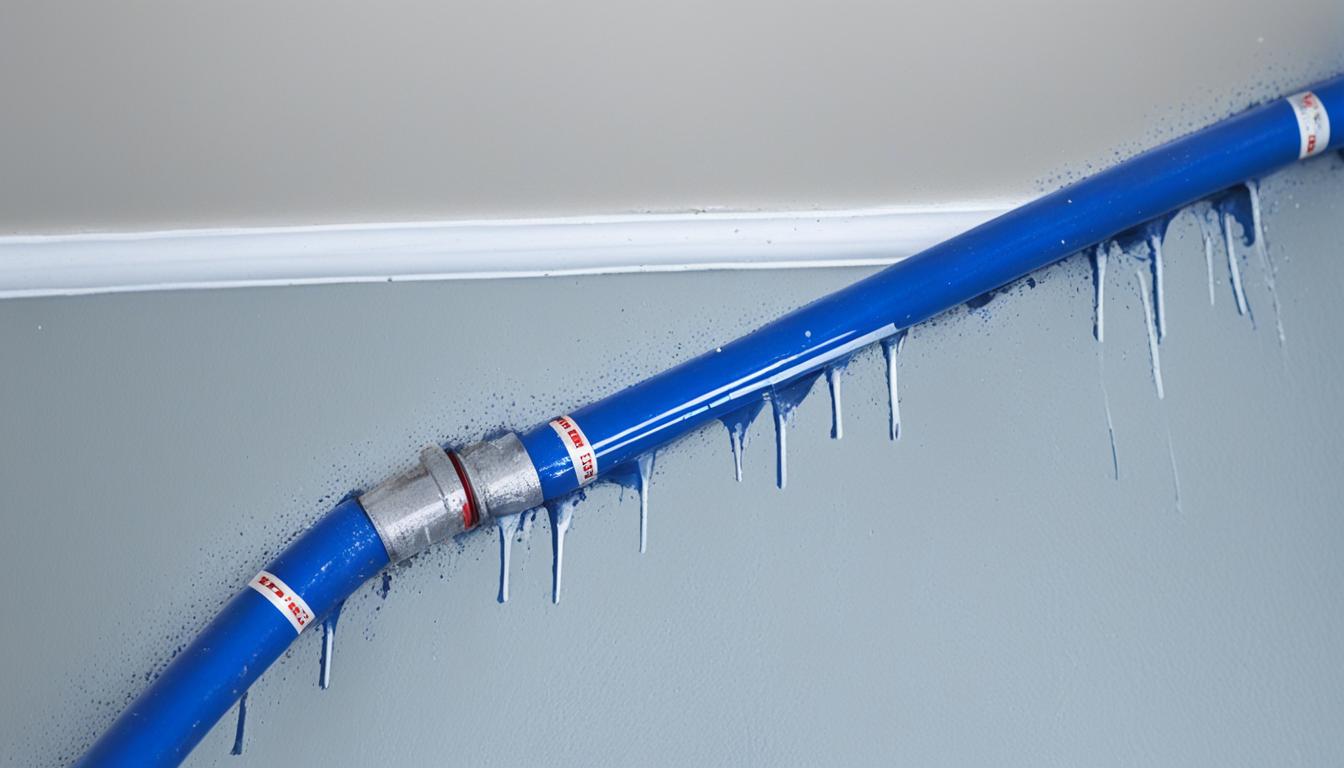Solve Basement Drain Backing Up – Quick Fixes
Did you know that basement drain backups can lead to significant water damage, costing homeowners thousands of dollars in repairs?
When faced with a basement drain backing up, it’s crucial to address the issue promptly to prevent further damage and potential health hazards. Fortunately, there are some quick fixes that can help resolve the problem and prevent future backups.
Key Takeaways:
- Fixing a basement drain backup promptly can prevent costly water damage.
- Avoid using chemical products like Drano, as they can damage the pipes.
- Tools like a drain snake, hose, or plunger can help unclog the drain.
- Identify the cause of the backup, such as a washtub basin, tree roots, or pipe deterioration.
- Professional assistance may be required for persistent backups or clogs caused by internal plumbing issues.
Basement Floor Drain Backing up: When Doing Laundry
When it comes to doing laundry and experiencing a basement floor drain backing up, it’s important to understand the underlying causes and take swift action to prevent further damage. The most common culprit behind a backed-up basement drain during laundry is a clogged drainpipe. Luckily, there are several DIY solutions to try before calling in professional plumber services.
To address a clogged drainpipe, start by cleaning the strainer on the drain inlet. Sediment and debris can accumulate over time, causing blockages. If cleaning the strainer doesn’t resolve the issue, using a plunger to clear sediment and debris from the trap under the wash tub basin may do the trick.
If these initial DIY methods fail to unclog the drain, it’s time to call in professional plumber services. A plumber can use a snake to remove the clog or even remove and clean the trap if necessary. They have the expertise and specialized tools to handle even the most stubborn basement floor drain backups.
Addressing a basement floor drain backing up promptly is crucial to prevent further backups and water damage. By taking action and ensuring proper drain maintenance, you can keep your basement dry and your drainage system functioning optimally.
Main House Trap Backup: Causes and Solutions
The main house trap is a crucial component of the main drain line, preventing noxious sewer gases from infiltrating your home. Unfortunately, backups from the main house trap occur due to clogs or defects further down the drain system. It’s essential to handle this situation delicately to prevent sewer water from entering your home and avoid exacerbating the problem.
If you suspect a clog in the main house trap, refrain from randomly removing the plugs. This action can inadvertently lead to sewer water backing up into your home or causing additional damage. Instead, follow these steps:
- Start by cautiously opening the street-side plug. This may allow the backup to drain away from your home.
- If the issue persists or there is a clog further down the line, it’s best to seek professional assistance.
A licensed plumber possesses the expertise and tools necessary to diagnose the cause of the backup and perform any required repairs or maintenance on the main house trap. They can ensure the issue is addressed effectively and that your drainage system functions optimally.
| Possible Causes | Solutions |
|---|---|
| Clogs in the main house trap | Seek professional plumbing services for clog removal and trap maintenance. |
| Defects further down the drain system | Consult a licensed plumber to diagnose the issue and perform necessary repairs on the main drain line. |
Floor Drain Backup: Causes and Precautions
A floor drain in the basement is designed to drain excess water and usually stays dry. However, clogs or excessive rainwater can cause the drain to back up. The backup could be due to a clog in the drain, the house trap, or the sewer main.
If you are experiencing a floor drain backup that cannot be easily resolved, it’s recommended to contact a sewer technician to investigate and resolve the issue. These professionals have the knowledge and tools to identify the cause of the backup and provide the necessary solutions.
Preventing floor drain backups can help save you from the inconvenience and potential water damage. Regular drain maintenance is essential to keep your drains clear and functioning properly. This includes regular cleaning, flushing with hot water, and using natural drain cleaners like vinegar and baking soda.
An effective precautionary measure to prevent future floor drain backups is to install sewer valves. These valves act as a barrier, preventing water from flowing back into your basement in the event of a sewer line clog or backup. It’s a proactive step that can provide you with peace of mind and protect your basement from potential water damage.
Remember, floor drain backups can be caused by various factors, including clogs in the drain, house trap, or sewer main. By taking preventive measures and ensuring regular drain maintenance, you can minimize the risk of floor drain backups and protect your basement from potential water damage.
| Cause | Precaution |
|---|---|
| Clog in the drain | Regular drain maintenance |
| Clog in the house trap | Regular drain maintenance |
| Clog in the sewer main | Installation of sewer valves |
Preventing Basement Sewer Backups
After experiencing a basement sewer backup, it’s important to take proactive steps to prevent future occurrences. One effective measure is to consider installing new plastic pipes, as they can address issues with damaged pipes and significantly reduce the likelihood of backups. By opting for sturdy and reliable plastic pipes, you can safeguard your basement against potential water damage caused by sewer backups.
Another crucial aspect of preventing basement sewer backups is practicing regular drain maintenance. Avoid flushing non-flushable items down the drain, as they can contribute to clogs and blockages in the sewer system. Additionally, proper disposal of grease and other substances can help maintain a clear and efficient drainage system, minimizing the risk of backups.
For an extra layer of protection against sewer backups, it is highly recommended to install backwater valves. These valves act as a barrier, preventing sewage from flowing back into your basement during heavy rainfall or when the main sewer line is overwhelmed. By installing backwater valves, you can significantly reduce the chances of basement sewer backups in the future.
Regular maintenance by a professional plumbing service is also crucial in ensuring the integrity of your drainage system and preventing future backups. Professional plumbers have the expertise to identify potential issues, perform inspections, and address any necessary repairs or maintenance. By entrusting your drainage system to professionals, you can have peace of mind and a well-functioning sewer system, free from the worries of basement backups.
- Investing Wisely: How Windows & Doors in Boost Property Value and Financial Health - April 24, 2025
- The Financial Impact of Personal Injuries: Why Legal Help Matters for Business Owners - April 16, 2025
- The Hidden Financial Costs of Domestic Assault: What Business Owners Need to Know - April 16, 2025














